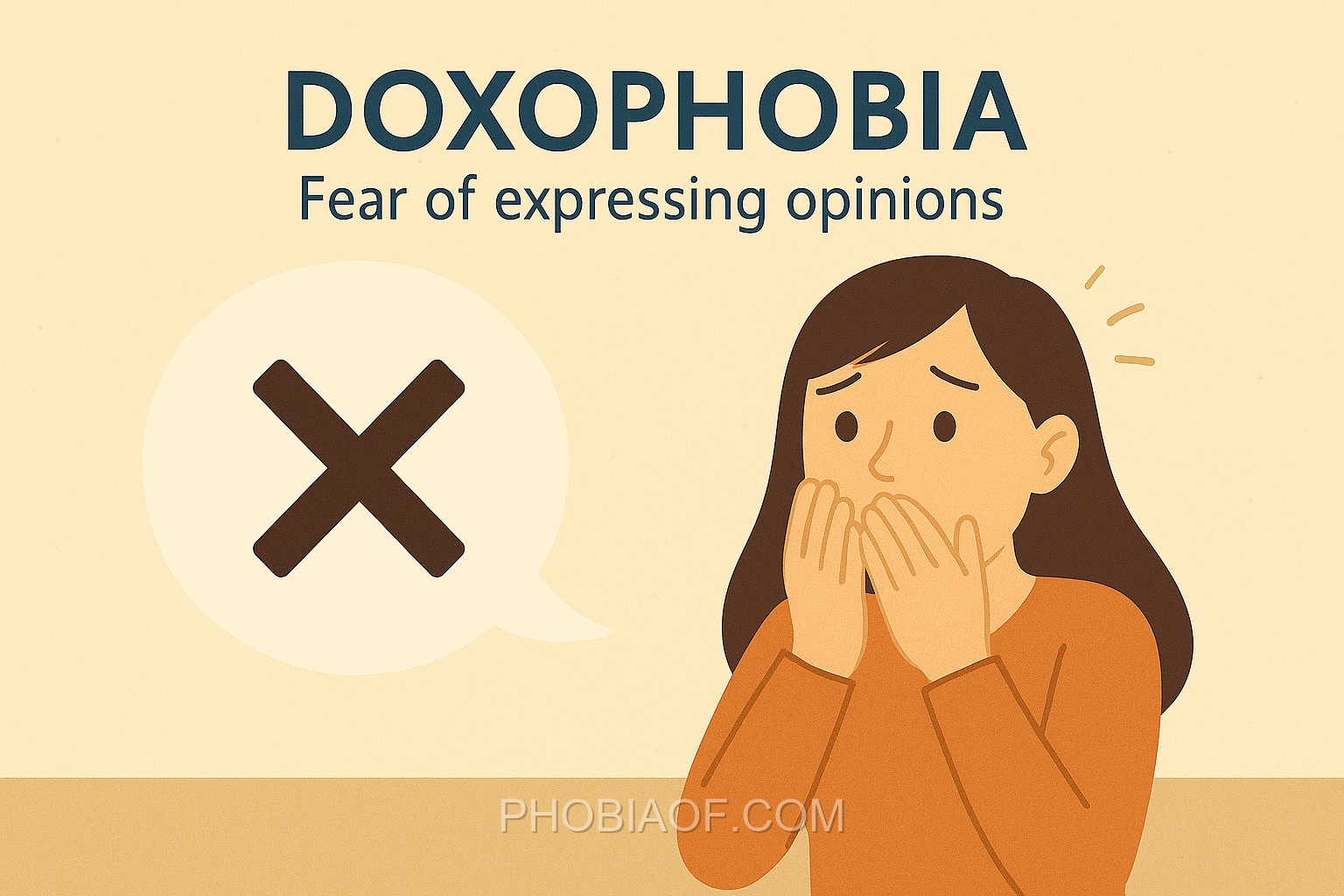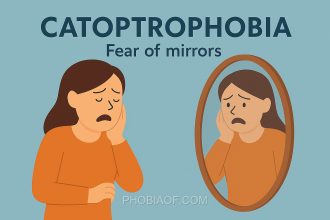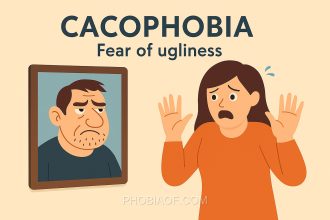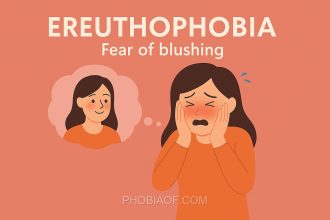Have you ever hesitated to share your thoughts in a group discussion, not because you were unsure of your ideas, but because you feared how others might react? If so, you might have experienced a glimpse of what some people face regularly due to a condition known as Doxophobia.
Doxophobia is the fear of expressing opinions or the anxiety about being judged for one’s thoughts. The term derives from the Greek words “doxa,” meaning opinion, and “phobos,” meaning fear. This phobia can manifest in various ways, from mild apprehension to severe avoidance of situations where one might need to voice their thoughts.
For individuals with doxophobia, the seemingly simple act of stating an opinion can trigger intense anxiety and self-doubt. This fear can lead to social withdrawal, missed opportunities for personal and professional growth, and a diminished sense of self-worth.
In general, doxophobia affects people by:
- Causing them to avoid situations where they might need to express their views.
- Leading to feelings of isolation due to a lack of participation in discussions.
- Hindering their ability to engage in healthy debates or contribute ideas in collaborative settings.
Understanding doxophobia is crucial, as it allows us to support those who struggle with it, encouraging a more inclusive and empathetic environment where everyone feels safe to share their voice.
Causes of Doxophobia
Doxophobia is the fear of expressing opinions or receiving praise. This phobia can significantly impact an individual’s personal and professional life. Understanding its causes can help in managing and overcoming this fear effectively. Below are some potential causes of doxophobia:
- Genetic Predisposition:
Some people may have a genetic tendency towards anxiety disorders, including phobias. If a family member has a history of phobias or anxiety, it might increase the likelihood of developing doxophobia.
- Traumatic Experiences:
Experiencing a traumatic event where expressing an opinion led to negative consequences can trigger doxophobia. For instance, being ridiculed or harshly criticized in public can leave lasting emotional scars.
- Learned Behavior:
Observing and imitating the behavior of others can also lead to doxophobia. If a child grows up in an environment where expressing opinions is discouraged or met with punishment, they may develop a fear of doing so.
- Psychological Factors:
Individuals with low self-esteem or a negative self-image might be more prone to doxophobia. The fear of judgment and rejection can exacerbate this condition.
- Environmental Factors:
The environment can play a role in the development of doxophobia. A highly competitive or judgmental atmosphere can foster fear of expressing oneself, especially if mistakes are highlighted over achievements.
Interestingly, some theories suggest that societal changes and the increasing pressure to conform to social norms might contribute to the rise of phobias like doxophobia. Research continues to explore the complex interplay between genetic, psychological, and environmental factors in the development of this fear.
Symptoms of Doxophobia
Doxophobia, or the fear of expressing opinions or receiving praise, can cause intense fear or anxiety in those affected. This phobia manifests through a variety of physical and emotional symptoms that can significantly impact daily life. Below is a list of common symptoms experienced by individuals with doxophobia:
- Intense Fear or Anxiety: Individuals may experience overwhelming fear or anxiety when faced with situations where they might need to express their opinions or receive feedback.
- Panic Attacks: Sudden episodes of intense fear may occur, often accompanied by physical symptoms.
- Sweating: Excessive sweating, especially in social or evaluative situations, is common.
- Rapid Heartbeat: An increased heart rate can occur in anticipation of or during situations that trigger the phobia.
- Trembling or Shaking: Physical trembling or shaking can be noticeable, especially when trying to speak or engage in public settings.
- Shortness of Breath: Difficulty breathing or a feeling of suffocation may accompany anxiety-inducing situations.
- Avoidance of Triggers: Individuals may go to great lengths to avoid situations where they might need to give their opinion or be praised, such as public speaking or group discussions.
- Overwhelming Dread: The thought of engaging in situations that trigger the phobia can lead to a sense of impending doom or dread.
- Low Self-Esteem: Persistent fear of judgment or criticism can contribute to feelings of low self-worth.
- Social Withdrawal: Avoiding social interactions to prevent situations that might trigger the phobia.
When doxophobia is severe, these symptoms can interfere significantly with daily life, making it difficult to engage in social, educational, or occupational activities.
Treatment for Fear of Expressing Opinions
Overcoming the fear of expressing opinions, known as Doxophobia, is entirely possible with time, patience, and the right strategies. It’s important to know that this phobia, like many others, can be treated and managed effectively. With professional help and self-guided techniques, individuals can regain confidence and feel more comfortable sharing their thoughts.
Proven Therapies
There are several therapeutic approaches that have been shown to help individuals overcome Doxophobia:
- Exposure Therapy: This therapy involves gradually and systematically exposing the person to the feared situation—in this case, expressing opinions—in a controlled and safe manner. Over time, this can help reduce fear and anxiety associated with speaking out.
- Cognitive-Behavioral Therapy (CBT): CBT focuses on changing the fearful thoughts and beliefs that contribute to the phobia. By challenging and reframing these thoughts, individuals can develop healthier patterns of thinking and reduce anxiety.
- Counseling: Speaking with a counselor can provide a supportive environment to explore the underlying causes of Doxophobia and develop strategies to overcome it. This can also help build confidence and improve communication skills.
Self-Help Coping Techniques
In addition to professional therapy, there are self-help techniques that can be beneficial:
- Relaxation Exercises: Techniques such as deep breathing, progressive muscle relaxation, or guided imagery can help reduce anxiety and promote a sense of calm.
- Meditation: Practicing meditation can help increase mindfulness and reduce stress, making it easier to manage anxiety related to expressing opinions.
- Support Groups: Joining a support group can provide a sense of community and understanding, where individuals can share experiences and learn from others facing similar challenges.
Medication
In severe cases, medication such as anti-anxiety drugs may be prescribed by a healthcare provider to help manage symptoms. However, the focus should remain on therapy and coping skills as the primary treatment methods.
Remember, seeking professional help is a vital step if Doxophobia is interfering with your daily life. A mental health professional can tailor a treatment plan to your specific needs, providing guidance and support every step of the way. With determination and the right approach, you can overcome the fear of expressing opinions and regain your voice.
Conclusion
Understanding the causes and symptoms of doxophobia can be a pivotal step in empowering individuals to confront and manage their fear of expressing opinions. By recognizing the underlying factors and acknowledging the impact of this phobia on daily life, individuals can begin to take proactive steps toward overcoming it. This awareness not only fosters self-compassion but also opens pathways to effective coping strategies.
It is important to remember that many people have successfully managed or even overcome their phobias with time, patience, and the appropriate support. Seeking professional help, such as therapy or consulting a doctor, can be invaluable in navigating the challenges posed by doxophobia. These resources offer personalized strategies and support, enabling individuals to gradually build confidence in expressing their thoughts and opinions.
Ultimately, facing doxophobia is a journey, and each step forward is a victory. By taking action and reaching out for support, you can reclaim your voice and embrace the power of your unique perspectives. Remember, you are not alone, and with the right guidance, overcoming this fear is within your reach.






